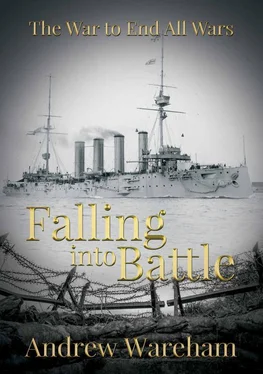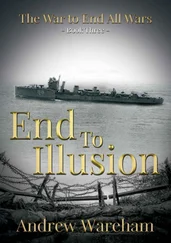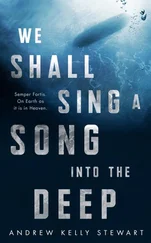“At which point we shall show our hostile faces, sir.”
“Exactly. We shall celebrate the onset of autumn by bashing a number of Huns most enthusiastically. If at all possible, we shall take the little ships by boarding and run them back to Harwich at our heels. There is much to be said for a gaggle of prizes – they provide pretty pictures for the newspapers.”
“We are likely to be close to Dutch waters, are we not, sir?”
“Of a certainty. Tight navigation will be essential. The Dutch are neutral, as you know, but they are also undecided on whose side they might be. Neutrality does not necessarily mean absolute even-handedness, you see, Sturton. Holland is a trading nation and will wish its vessels to be safe in the waters of the North Sea and the Atlantic, which suggests they might well bow towards us – but not if we arrogantly infringe their rights as neutrals. We must not venture inside their waters, even if the Germans do. We must in fact make a show of halting at the three mile limit, shaking our heads at the naughty Huns.”
“The Dutch navy is small, is it not, sir?”
“Coast defence, purely. They have been thinking about battleships but haven’t got any – the same for modern cruisers. They do have destroyers, torpedo boats and submarines sufficient to be an irritation. Best to avoid any action that will offend them, particularly as they have a moderately effective army with a deal of colonial experience. The Admiralty will not love us if we create an incident with the Dutch.”
Another worry for a first lieutenant – he must always make sure that the ship’s position is known to the cable when close to the coast and now he must know precisely where the frontier lays. Fortunately, the Dutch would not have removed their buoys and lightships, being at peace.
Simon had a quiet word with Sublieutenant Parrett, driving home the absolute need for precise navigation when close to Holland. If the Sub made a mistake, it could not be his fault entirely, being so junior, and neither could the captain be wholly to blame; that left the first lieutenant neatly in the middle.
They took on their oil, swearing at the filth inevitably left on their decks. There were always drips and splashes as the hoses were disconnected and it was never possible to put down enough sacking and sand in the right places, which led to an hour at least of cleaning afterwards.
It was nothing compared to the mess left by coal but oil was particularly sticky and irritating. The men far preferred oil – coal was shifted in one hundred and forty pound sacks which was good enough argument in itself – but it stank and tainted food for the rest of the day.
“Count your blessings, Mr Sturton. At least the officers do not have to set an example when oiling.”
That was true, Simon accepted. In coal burners the officers always turned to with the men, running faster and showing that anything the hands could do they could do better. The labour was killing, occasionally literally for older men with unsuspected heart conditions.
“In all aspects ready to proceed, sir.”
“Very formal, Mr Sturton. Correct, too. Better by far to be too formal than ever to be slack. I will take her out on this occasion. Yeoman, signal the half flotilla to follow father.”
The Yeoman made the correct signal, ‘flotilla to follow in line astern’. He did not approve of officers’ humour.
“Acknowledged, sir.”
“Taking us four miles out, Mr Sturton. Gives a better chance of seeing lights along the coast and avoids small boats out crabbing and shrimping on the banks.”
That was sensible, Simon thought, noting the existence of inshore fishermen for future reference. If he might have a coastal launch or gunboat of his own one day, he must know such things.
“Checking the guns, sir.”
He left the little bridge and walked the few paces forward to the four inch, spoke to the gunlayer and then down to the twelve pounders and to the after four inch. On his way back he stopped by the tubes and the Commissioned Gunner, Mr Harker.
“Too small for torpedoes, we must expect, Mr Harker.”
“Almost certainly, sir. You never know, though – they might let a cruiser out, sir.”
“Always possible. We can but hope. A pair of mouldies will do a lot of good in the right place then.”
“Provided they run straight, yes, sir.”
“True enough, Mr Harker!”
Simon returned to the bridge. He was off watch and could have sat back in the wardroom but it was desirable for a First Lieutenant to know what was going on at all times, and if there was the least chance of action he should be at the captain’s side.
“Don’t forget to sleep sometimes as well, Mr Sturton. Get a couple of hours now – we won’t be doing anything this side of midnight.”
Simon retired, took off shoes and jacket and rolled into his bunk. Undressing for sleep was restricted to harbour.
Two hours sleep was insufficient but would keep him going for another twelve at least; he returned to the darkened bridge a little more alert than he had left. Something out of the ordinary caught his attention, a feeling that something was wrong, and made him look about until he spotted it.
“Robin showing a light, sir.”
The destroyers were blacked out.
“What? Where?”
Captain Smallwood turned and spotted the faint offending glow instantly.
“Wardroom scuttle not fully covered. Yeoman! Make to Robin, ‘Why are you lit up like Piccadilly Circus?’”
A minute while they tried to find the source of the offence and the light disappeared. A signal lamp flickered rapid Morse.
“’Have flogged midshipman’, sir.”
“Make, ‘Hang him next time.’”
“Acknowledged, sir.”
Simon smiled, briefly.
“There’s a young fellow can forget about his next shore leave, sir.”
“Robin’s CO recommended his mid for promotion only last week. He can forget about that as well. Six more months before that one makes sublieutenant.”
“Quite right, too. No place for carelessness in the wardroom, sir.”
An uncovered light could disclose the ship to a waiting enemy; it was intolerable.
Navigating by dead reckoning at night only four miles offshore was a hair-raising pastime. The Belgian coast had been surveyed repeatedly for centuries, was one of the best-known of the world’s sea areas, but currents could vary by a knot or two effectively at random following heavy rain inland and increased flow in the rivers, and sand and mud banks crept continuously and not entirely predictably. Three fathoms of water could become two overnight and running aground was not impossible in broad daylight – but was inexcusable in any naval ship.
A destroyer’s bridge was tiny and had no dedicated chartroom; it was open to the weather so charts could not be held in the hand. The officer of the watch had to work by intelligent guesswork. They could not afford the noise of a leadsman in the bows, shouting depths to them; sound carried far over water in the quiet of the night.
“We are in five fathom water, Number One, and coming up on Ostend. Continue this course at four knots, paralleling the shore. I will get my head down until an hour before dawn. Wake me then if I’m not moving.”
Simon stood and concentrated on the feel of the ship, hoping that he might notice a change in movement if they found shallower water.
The lookouts changed every thirty minutes – staring into darkness was hard on the eyes and worse on the brain. Even the best, most experienced men could start to see things in the night.
“Kye, sir?”
“Please.”
The hot cocoa was welcome in the small hours, thick with condensed milk and sugar and providing energy to burn.
“Shellfire inland, sir.”
Читать дальше












